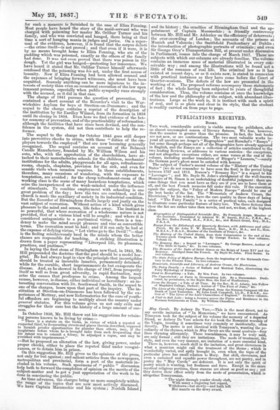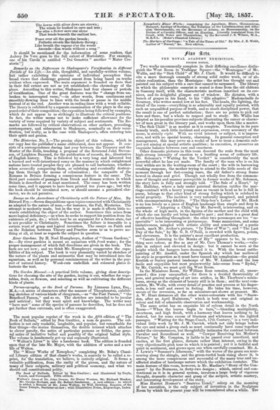PUBLICATIONS RECEIVED.
Boors.
Tins week, considerable activity is visible among the publishers, after an almost unexampled season of literary flatness. We fear, however, that the number is greater than the promise. In fact, the best books are not new, or are continuations. Tho two most valuable works beyond all question are Arago's " Biographies " and Ilerschers "Essays" ' but some though perhaps not all of the Biographies have already appealed in English, and the Essays are a collection of articles contributed to the two leading Reviews, or addresses to various societies : the exceptions, and not altogether exceptions either, are some verses at the end of the volume, including another translation of Burger's "Leonora,"—surely the German poet's ghost must be satisfied with honour.
The subject of Tucker's second volume of the "History of the United States" (we do not remember to have seen the first) is the period lying between 1797 and 1813. Borrow's "Romany Rye" is a sequel to his " Lavengro " ; and Mr. Bayle St. John's abridgment of the well-known Memoirs of St. Simon is an undertaking of doubtful judgment : there are some things that you must have as they are if you are to have them at all, and the best French memoirs fall under this rule. If the execution equals the subject, the "Policy of Modern Europe" should be one of the best books of tho list. The "Memorials of Andrew Crosse, the Electrician," by his widow, have the rare quality in these days of being brief. "The Fairy Family" is a series of poetical tales, each designed to illustrate some particular feature of fairy lore. The three fictions that close the list are rather tales than novels, and not, we fear, of the highest class.
Biographies of Distinguished Scientifie Hen. By Francois Arago, Member of the Institute. Translated by Admiral W. H. Smyth, D.C.L., F.R.8., the Rev. Baden Powell, M.A., F.R.S., &c., and Robert Grant, Esq., M.A., F.R.A.S.
Essays from the Edinburgh and Quarterly Reviews, with Addresses and other
PMTS. By Sir John F. W. Herschel Bart., K.11., M.A., and E., Hon, M.R.I.A., P.R.A.S., Member of the Institute of France, bto.
The History of the United States, from their Colonization to the end of the Twenty-sixth Congress, in 1841. By George Tucker. In four volumes. Volume II.
The Romany Rye : a Sequel to " Lavengro." By George Borrow, Author of " The Bible in Spain," &e. In two volumes.
The Memoirs of the Duke of Saint Simon on the Reign of Louis XIV and the Regency. Abridged from the French. By Bayle 8t. John. First Series. In two volumes.
The State Policy of Modern Europe, from the beginning of the Sixteenth Century to the Present Time. In two volumes.
Memorials, Scientific and Literary, of Andrew Crosse, the Electrician.
The Fairy Family : a Settee of Ballads and Metrical Tales, illustrating the Fairy Mythology of Europe.
Good in Everything : a Tale. By Mrs. Foot. In two volumes.
The Unprotected; or Facts in Dressmaking Life. By a Dressmaker. Dedicated, by permission, to the Right lion. the Earl of Shafteabury.
divan the Sleeper : a Tale of all Time. By the Rev. H. C. Adams, late Fellow of Magdalen College, Oxford ; Author of The First of June," 80e. The Lives of the Chief Justices of England, from the Norman Conquest till the Death of Lord Tenterden. By John Lord Campbell, LL.D., F.R.S.E., Author of " The Lives of the Lord Chancellors of England." In three volumes. A Visit to Salt Lake : being a Journey across the Plains and Residence in the Mormon Settlements at Utah. By William Chandless.
lliray Carols. By Aubrey De Vero.—This is the most direct, not to say servile imitation of "In Memoriam," we have encountered. As Tennyson took for the subject of his volume the memory of a departed Mend, so Aubrey Do Vere selects for hie book the Romanist worship of the Virgin, treating it sometimes very remotely or incidentally, often directly. The metre is not identical with Tennyson's, wanting the peculiarity of the rhymes, which in May Carols are the usual quatrain—four lines rhyming alternately. These resemblances, it may be truly said, are only formal ; still they are imitations. The mode of treatment, the style, and even the very manner, are imitation of a more essential kind. There is, however, much skill in the imitation, and great cleverness in what a musician might call the treatment of the theme ; which is wonderfully varied, and aptly brought in, even when the topic of the particular piece has small relation to Mary. But skill, cleverness, and even a sustained and equable power throughout, arc not poetry, and in poetry the "May Carols" are deficient. It is not only the spirit of poetry which is wanting, but freshness and force. Except in the more mystical religious portions, these stanzas are about as good as any ; yet they derive their effect solely from the mode of presentation, which is altogether Tennysonian.
"The night through yonder cloudy cleft, With many a lingering last regard, Withdraws-but slowly—and hath left Her mantle on the dewy sward. The lawns with silver dews are strewn ; The -winds lie hushed in cave and tree ; Nor stirs a flower save one alone That bends beneath the earliest bee.
Peace over all the garden broods; Pathetic sweets the thickets throng ; Like breath the vapour o'er the woods Ascends—dim woods without a song."
It should be mentioned for the information of some readers, that Aubrey De Fore goes to the full extent of Mariolatry. For example, one of his Carols is entitled " Dei Genetrix " another "Mater Creatoris."] Bentarks on the Diftretwes ist Shakespeare's Versificaticaz in different Periods of his Life.—An able, thoughtful, and carefully-written volume, but rather exhibiting the opinions of individual perception than broad views that challenge general assent from being based on truths evident when expressed. The main argument is founded on facts that in their full extent are not as yet established—the chronology of the plays. According to this writer, Shakspere had four classes or periods of versification. One of the great features was the "change from unbroken to interrupted verse,"—in other words, from continuoos and smoothly-flowing lines to lines with the break or pause in the middle instead of at the end. Another was in ending lines with a weak syllable. The theory is exhibited by a separate examination of the plays in the supposed order of their composition; the exposition being followed by examples, which do not appear to us strikingly to illustrate the critical positions. In fact, the writer seems not to make sufficient allowance for the variety of verse required by variety of subject and sentiments. The Remarks are followed by critical observations on other authors, preceding, contemporary, and subsequent to Shakspere nominally on their versification,. but really,. as is the case with Shakspere's, often entering into their spirit and genius.
The Historian. No. I.—The precise object of this volume, which in our copy has the publisher's name obliterated, does not appear. It consists of a correspondence during last year between the Treasury and the Master of the Rolls, touching a proposal of the Reverend John Stevenson, of Leighton Buzzard, for the publication of records, &c., illustrative of English history. This is followed by a very long and laboured but a learned and well.-intentioned essay on the manner in which enlightened nations have treated peoples they are pleased to call barbarians, whether when avowedly conquering them, or subduing and eventually destroying them through the means of colonization • the conquests of the Romania in Britain forming a conspicuous feature in the essay. The third part consists of passages from Greek and Roman writers in which Britain is described or at least mentioned. The essay has been written some time, and it appears to have been printed ten years ago ; but why the book should be circulated now, or should assume a periodical character, we do not perceive.
Essays on the Aecordanee of Christianity with the Nature of Man. By Edward Fry.—Seven disquisitions upon topics connected with Christianity as adapted to the nature of man,—for instance, the Fall, Mysteries. The attempt is modestly made, but in the way it is made it effects little towards establishing the object of the author. Sometimes this arises from mere logical defleieney,—as when he seeks to support his position from the existence of pain, &e. ; which may be an argument for a future state, but is not peculiar to Christianity. Sometimes the failure is traceable to a certain want of grasp and logical invention. The essays on Faith and on the Relation 'between Theory and Practice seem to us to prove nothing at all, at least as regards the subject in question.
.River Gardens. By H. Noel Humphreys, Author of "Ocean Gardens," &c.—By river gardens is meant an aquarium with fresh water; for the proper management of which full directions are given in the book. The facts are not new, and we think Mr Humphreys exaggerates the capabilities of his subject. The book is very pleasantly varied by sketches of the nature of the plants and animantia that may be introduced into the aquarium, as well as by personal reminiscences of the writer in the pursuit of natural history. Wood-cuts embellish and coloured plates illustrate the text.
The Garden Manual.—A practical little volume, giving clear descriptions for choosing the site of the garden, laying it out, whether for vegetables, fruit, or flowers, and selecting as well as cultivating the different kinds of plants.
Parson-ography, or the Book of Parsons. By Linnteus Lynx, Esq., 11.A.—A series of characters after the manner of Theophrastus, exhibiting sketches of various kinds of clergymen,—as "the Fast Parson' " "the Beneficed Parson," and so on. The sketches are intended to be jocular and satirical ; but they want spirit and knowledge. The writer may "have met" some of the species of parsons he describes, but he does not get further than externals, and is often exaggerated.
The most popular reprint of the week is the _fifth edition of "The Book of Ballads," edited by Bon Gaultier, a nom de guerre. The collection is not only readable, laughable, and popular, but remarkable for four things—the stories themselves, the double interest which attaches to clever parody, the satire of particular persons or foibles, the general satire of imitative ballad and possibly of the original ballad style. The volume is handsomely got-up and copiously illustrated. " Walton's Lives" is also a handsome book. The edition is founded upon that of the late Mr. Major, with the addition of notes and a new life of Walton.
The "Minor Works of Xenophon," completing Mr. Bohn's Classical Library edition of that classic's works, is scarcely to be called a reprint, for the translation, we believe, is entirely original. It forms a valuable publication, from the rarity of the pieces, and the nature of many of their subjects, military and political economy, and what we should call constitutional polity.
The Book of Ballads. Edited by Bon Gaultier ; and illustrated by Doyle, Leech, and Creorquill. Fifth edition.
Walton's Lives of Dr. John Donne, Sir Henry Wooton, Mr. Richard Hooker, Mr. George Herbert, and Dr. Robert Sanderson. A new edition : to which is added, a Memoir of Mr. Inas Walton, by Will. Dowling, Esquire, of the Inner Temple, Banister-at-law ; with Illustrative Notes, Engravings, Index &e. Xenophon's Minor Works; comprising the Ag,esilaus, Hiero, (Econornicus, Banquet, Apology of Socrates, the Treatises on the Lacedtemonian and Athenian Governments, on the Revenues of Athens, on Horsemanship, on the Duties of a Cavalry Officer, and on Hunting. Literally translated from the Greek, with Notes and Illustrations, by the Reverend J. S. Wilson, M.A., M.R.S.L. (Bohn's Classical library.) The Martyrs of Carthage : "a Tale of the Times of Old." By Mrs. J. B. Webb, Author of" Naomi," &..c. New edition.



























 Previous page
Previous page